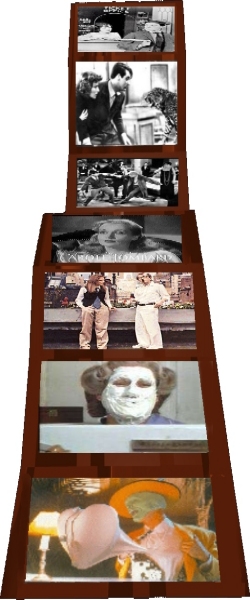
Notes and Study Questions
for the Production Code and Bergson
The following notes
and study questions are designed to help you understand and think through
issues raised by both the Production Code and the excerpt from Bergson's
book. We do not expect you to submit formal written answers to the
questions. If you have difficulty answering the questions, raise
those difficulties in class discussion.
The Production Code
(enforced summer 1934 to late 1950s)
You work in the Hays
Office. Let's say for argument's sake that you
screen two new films,
I'm
No Angel and Duck Soup. What about each film must go back
to the studio for revision? Why?
Bergson, excerpt
from Laughter
Henri Bergson (1859-1941)
was an eminent French philosopher. He wrote a small book on laughter
(Le Rire) in 1900, exactly 100 years ago. Most of what he
analyzed in this wonderful essay is what Freud will, a few years
later, call "the comic."
Note that the comic isn't the only funny type of thing that causes laughter.
We'll study other laughable phenomena soon, but Bergson really formulates
"the comic" and the mechanism of laughing in
an intriguing and original
way.
A. (1) Do you
agree that the comic must always involve something human? Is there
such a thing as a comical event involving weather, or something else completely
nonhuman?
(2) Absence of feeling
necessary for laughter to occur: Bergson says
that to laugh at the
person slipping on a banana peel, we have to not be
concerned emotionally
for that person. Then how can you laugh at yourself if you trip and
fall? Does Bergson's idea still work?
(3) Laughter is always
laughter of an implied group; it is social.
B. Once you've read
the entire selection, recall that Noel Carroll based his sight-gag study
on a theory that comedy arises from incongruity. Bergson's emphasis is
quite different. Could their two theories overlap. or are they mutually
incompatible?
Laughter happens when
we witness a person's clumsiness, inelasticity,
rigidity, automatism,
"unconsciousness," etc. List the attributes/failings that lead to
laughter in Bergson's eyes, and understand what he's getting at.
For Bergson, the essence
of being alive is being "aware," in touch with
the environment and
able to adapt to changes, being flexible, having
"tension and elasticity"
(p. 72).
How is laughter "a sort
of social gesture"? What kind of gesture? How
does it function in
Bergson's view as a corrective? Correcting what?
C. Which of the film
situations and comedians seen thus far in the course
are "comic" in Bergson's
definition? Which do not accord with his definition?
-
W.C. Fields
-
losing his glasses and
asking where they are,
-
forgetting the ice on the
stove,
-
leaving the fat man in
the steam room too long,
-
claiming credit for catching
the thief
-
Buster Keaton
-
slipping on the banana
peel he planted for his rival
-
ingeniously escaping the
criminals' lair with the old lady costume on
-
watching the movie screen
to see how to kiss and propose to his girlfriend
-
rescuing his girlfriend
by disguising her as a sack of shoes
-
Harold Lloyd
-
continuing to crawl on
the dept. store floor when the
-
cart he was hiding behind
has turned away
-
climbing anxiously up the
side of the building
-
Charlie Chaplin
-
vamping for the camera
in Kid Auto Races
-
continuing to turn his
wrenches after he's off the assembly line
-
carrying a ladder and hitting
his co-worker as he turns with it
-
dismantling an alarm clock,
holding a stethoscope to it
-
Mae West
-
saying suggestive and witty
things to and about men
-
Katharine Hepburn
-
not knowing her evening
gown is ripped in the restaurant
-
Cary Grant
-
"I'll be with you in a
minute, Mr. Peabody"
-
Hepburn and Grant
-
crawling around trying
to communicate with George to get the bone
-
becoming Donald the Duck
and Swingin' Door Susie
|

